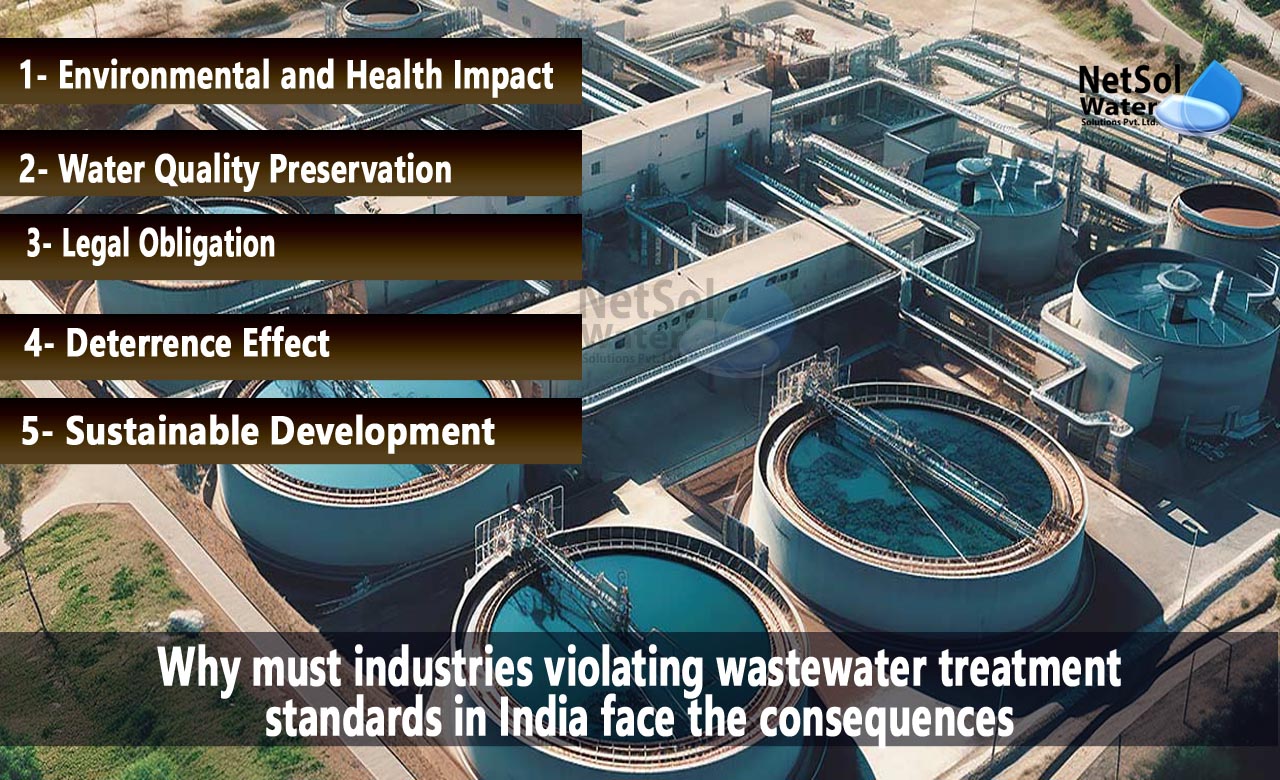The consequences of violating wastewater treatment standards in India
India's quick industrialization has advanced the country economically and had many positive effects, but it has also resulted in a large rise in the production of industrial effluent. India has set wastewater treatment standards and laws to protect the environment and public health. Nonetheless, certain companies persist in disregarding these guidelines, thereby presenting grave risks to the environment and human welfare. We'll talk about the penalties that Indian industries that violate wastewater treatment requirements must pay in this blog post.
· Protection of Environmental Health
The preservation of the environment's health is one of the main justifications for holding industries responsible for breaking wastewater treatment regulations. Hazardous chemicals and pollutants found in wastewater can damage natural water bodies, soil, and air. These pollutants affect ecosystems in a profound and long-lasting way, which has an effect on the health of the environment and the people who depend on it. To stop the degradation of our natural resources and safeguard the general welfare of the country, it is imperative that those who violate the law be held accountable.
· Preserving Water Quality
Water that is safe and clean is an essential requirement for all living things. India already faces challenges in managing its water resources because of over-exploitation, pollution, and dwindling supplies. This issue is made worse by industries that fail to follow wastewater treatment regulations, which lowers the quality of the water. Such acts have terrible repercussions that impact drinking water sources, agriculture, and public health in general. To preserve the quality of the water resources that are currently available, enterprises must make sure they adhere to treatment regulations.
· Adherence to Legal Framework
India has put in place a thorough legislative system to control the treatment of industrial effluent. The Environment (Protection) Act of 1986 and the Water (Prevention and Control of Pollution) Act of 1974 both provide precise guidelines for industrial discharges and specify the consequences of non-compliance. It is not only a legal obligation but also an environmental one to hold industries responsible. In order to protect the rule of law and preserve the legitimacy of the regulatory framework, violators must bear the penalties.
· Deterrence Effect
There is a deterrent effect when industries that breach wastewater treatment regulations are penalised. Industries are more inclined to take wastewater treatment seriously when they observe that offenders are subject to penalties and legal action. Industries can invest in appropriate treatment facilities and follow regulations out of fear of financial fines, legal action, or reputational harm. Over time, this can lead to a considerable decrease in infractions.
· Protection of Ecosystems
India is home to a wide range of habitats, including rivers, oceans, wetlands, and forests. These ecosystems may suffer greatly if wastewater that has not been properly treated is released. It may result in the devastation of habitats, the loss of biodiversity, and changes to the food chain. Holding industries responsible for their activities can help to lessen these negative effects and guarantee that our natural heritage is preserved.
· Public Health and Safety
Public health and safety are directly impacted by wastewater infractions. Waterborne illnesses can result from contaminated water, putting the health and welfare of neighbouring people atserious danger. We protect the most vulnerable communities, who are frequently disproportionately impacted by poor water quality, by enforcing repercussions for industrial infractions.
· Observance of International Agreements
India has ratified a number of international conventions and agreements, including the Sustainable Development Goals (SDGs) and the Paris Agreement. These agreements contain pledges for the sustainable use of the environment and the prudent use of natural resources. Ensuring enterprises comply with wastewater treatment requirements is a subject of international commitments as well as national importance.
· Technological Advancements
With the substantial advancements in modern wastewater treatment technologies, industry may now more easily meet strict treatment criteria. Encouraging firms to invest in and implement these cutting-edge technology can result in wastewater treatment systems that are more economical and efficient when breaches are held accountable for.
· Economic Repercussions
Industries that consistently disregard wastewater treatment regulations may experience negative economic effects. Financial hardship may result from court fees, fines, and penalties. In addition, a company's reputation may be damaged by such infractions, which could harm investor trust and market standing. Industries are compelled to prioritise wastewater treatment in order to prevent negative effects on their bottom line due to the economic consequences of non-compliance.
· Sustainable Industrial Growth
A long-term objective that strikes a balance between environmental responsibility and economic development is sustainable industrial expansion. Adopting sustainable practises is encouraged in industries by enforcing sanctions for wastewater treatment standard violations. In addition to protecting the environment, this helps industries expand in a way that supports India's goals for sustainable development.
Conclusion
It is essential to hold enterprises responsible for exceeding wastewater treatment standards in India. Enforcing the law is necessary to safeguard public health, maintain water quality, uphold the legal system, and discourage future infractions. Violating industrial wastewater regulations has repercussions that go beyond the immediate harm to the environment; they also have an influence on ecosystems, public health, and even the nation's reputation abroad. To ensure a cleaner and more sustainable future for the country, it is crucial that the regulatory bodies in India strictly enforce wastewater treatment requirements and hold industries responsible for their activities.



